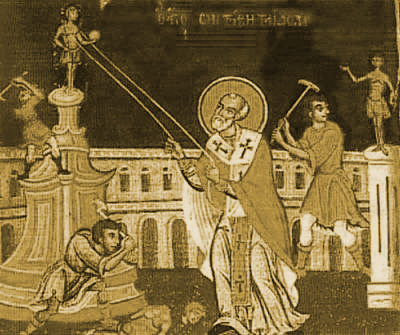Below, an abridged translation from the first volume of Karlheinz Deschner’s Kriminalgeschichte des Christentums (Criminal History of Christianity). For a comprehensive text that explains the absolute need to destroy Judeo-Christianity, see here. In a nutshell, any white person who worships the god of the Jews is, ultimately, ethnosuicidal.
Ambrose’s struggle against Hellenism
Like many other Church fathers, Ambrose was subject to the influence of Greco-Roman philosophy, especially Plotinus. However, he speaks of it quite critically, relating it to ‘idolatry’, a special invention of Satan, and also to the ‘heretics’, especially the Arians. If this philosophy has something good it is that it comes from the ‘Holy Scriptures’, from Ezra, David, Moses, Abraham and others. It also considers all the natural sciences as an attack on the ‘Deus maiestatis’. The Hellenism is for him, as a whole, an ‘arma diaboli’, and the fight against it ‘a fight against the Empire of the devil’ (Wytzes).
The young Gratian at first had given a good treatment to the Hellenists, but he learned from his spiritual mentor ‘to feel the Christian Empire as an obligation to repress the old religion of the state’ (Caspar). This was no longer difficult, since Christianity was established and paganism was in retreat. After the visit to Rome by Gratian and his co-regent in 376, the city, still largely clinging to the old faith, experienced the destruction of a sanctuary of Mithras by the prefect Gracchus, who, pending baptism, thus demonstrated his merits.
In the summer of 382, Ambrose was in Rome, probably horrified by the many Gentiles, the ‘demented dogs’, as were called by Pope Damasus I, a Spaniard, and while he was talking about persecution, the Christian members of the Senate had to pay their official oath before the image of the goddess Victoria.
At the end of that same year, the sovereign (who would soon be assassinated) disposed, ‘evidently by the advice of Ambrose’ (Thrade), ‘with all certainty not without the influence of his paternal adviser Ambrose’ (Niederhuber), a series of peremptory anti-Hellenist edicts for the city, by virtue of which the support of the State was withdrawn from various cults and clergy, like the popular Vestals, the exemption from taxes was annulled and the ownership of the land of the temples was denied.
 The monarch also ordered the removal of the statue of the goddess Victoria, a masterpiece of Tarentum taken from the enemy and also a highly venerated symbol of Roman rule. Since Victoria was one of the oldest national deities, with a cult statue in the Senate hall since the time of Augustus (only Constantius II had recently withdrawn her), most of the senators and Hellenist citizens of Rome felt offended about what was most sacred.
The monarch also ordered the removal of the statue of the goddess Victoria, a masterpiece of Tarentum taken from the enemy and also a highly venerated symbol of Roman rule. Since Victoria was one of the oldest national deities, with a cult statue in the Senate hall since the time of Augustus (only Constantius II had recently withdrawn her), most of the senators and Hellenist citizens of Rome felt offended about what was most sacred.
______ 卐 ______
Liked it? Take a second to support The West’s Darkest Hour.
3 replies on “Kriminalgeschichte, 61”
Nothing like the visage of a beautiful woman to inspire men to great deeds.
…the support of the State was withdrawn from various cults and clergy, like the popular Vestals, the exemption from taxes was annulled and the ownership of the land of the temples was denied.
Or, in other words, the accumulated wealth of the pagans was confiscated by the Christian state. We know from Gibbon that a considerable part of the wealth of the Empire was concentrated in the pagan sacred groves, temples, and lands. For an state that was perpetually strapped for cash, they made a very tempting target. What was the technical innovation that made Christianity so different? Its intolerance. The pagan cults were all tolerant of each other. Before Christianity, people could believe whatever they wanted to believe. This changed only with the ascendancy of the jealous semite god and his incarnation as the crucified rabbi. The state began to regulate belief; the dawn of political correctness. Christian intolerance for other religious beliefs was precisely what made it attractive to the state. There was money to be gained by it, and so it became the state religion.
link